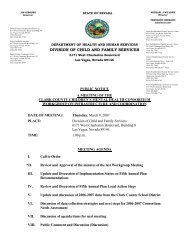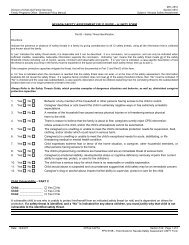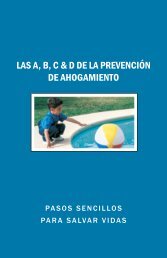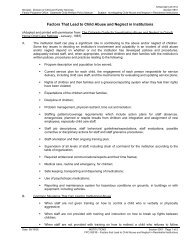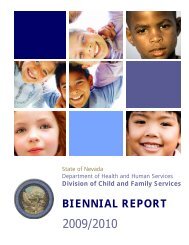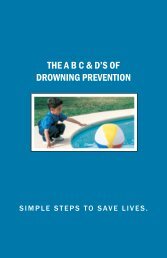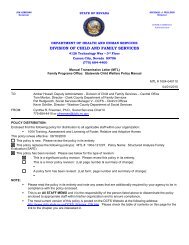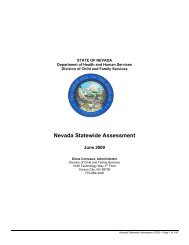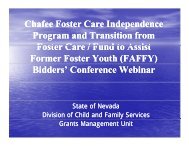STATE OF NEVADA - Division of Child and Family Services
STATE OF NEVADA - Division of Child and Family Services
STATE OF NEVADA - Division of Child and Family Services
Create successful ePaper yourself
Turn your PDF publications into a flip-book with our unique Google optimized e-Paper software.
multidisciplinary processes <strong>and</strong> recommendations are reviewed <strong>and</strong> adopted into practice. In addition, n the past year<br />
WCDSS has implemented several new policies as a result <strong>of</strong> the QI process <strong>and</strong> new legal requirements. Their local<br />
policy manual has been updated related to case management, including Sections 13 <strong>and</strong> 20. Section 13, Case<br />
Management for Legal Cases was revised to incorporate <strong>Family</strong> Solution Team Meetings. Section 20, Hearings was<br />
revised pursuant to AB 364 <strong>of</strong> the 2009 Legislature <strong>and</strong> was distributed to staff. In addition, an Agency policy regarding<br />
Request for Warrants was drafted <strong>and</strong> submitted to the District Attorney’s <strong>of</strong>fice for review <strong>and</strong> approval.<br />
The DCFS-Rural region opted to use a slightly different case review method than the one originally used statewide. In<br />
their internal process, in alternating quarters, each <strong>of</strong> the four Rural Region districts undergoes a case review process.<br />
Using this method, one case from each worker within the District is selected <strong>and</strong> reviewed by the Quality Improvement<br />
Unit review team. These reviews <strong>and</strong> data are then provided to the DCFS-Rural Region Management Team to discuss<br />
training opportunities. In addition, the Rural Region Managers <strong>and</strong> Supervisors engage in regular staffings to go over<br />
cases on an ongoing basis as part <strong>of</strong> regular staff meetings to ensure that quality is present. Information from these case<br />
reviews is forwarded to the Quality Assurance-Training Unit so that the information learned can be disseminated to the<br />
field.<br />
In the past year, CCDFS developed a new initiative which includes the development <strong>of</strong> a comprehensive case review<br />
system for all three direct practice child welfare programs (i.e. <strong>Child</strong> Protective <strong>Services</strong> (CPS), In-Home <strong>and</strong> Out-<strong>of</strong>-<br />
Home (OOH) <strong>Services</strong>). Over the course <strong>of</strong> SFY 2010, the CCDFS Quality Assurance <strong>and</strong> Improvement Unit completed<br />
a total <strong>of</strong> five supervisory case reviews <strong>and</strong> 24 in-home case reviews. Supervisory case reviews consist <strong>of</strong> either helping<br />
a supervisory complete their probationary period, or because <strong>of</strong> personnel issues within the unit. In-home case reviews<br />
began in November 2009 <strong>and</strong> consist <strong>of</strong> monthly reviews <strong>of</strong> each <strong>of</strong> the five units. As <strong>of</strong> the end <strong>of</strong> SFY 2010, all five<br />
units were completely reviewed. A challenge reported by CCDFS to this process, is that while the in-home case review<br />
process has been fully implemented, CPS <strong>and</strong> OOH case reviews have been delayed. This is because <strong>of</strong> decreases in<br />
staff in the QA/QI unit by approximately 40%.<br />
Overall, the 2009 CFSR report rated this item as a strength for Nevada.<br />
Systemic Factor D: Staff <strong>and</strong> Provider Training<br />
Item 32: Initial staff training<br />
Goal: The State will operate a staff development <strong>and</strong> training program that supports the goals <strong>and</strong> objectives in the<br />
CFSP, addresses services provided under titles IV-B <strong>and</strong> IV-E, <strong>and</strong> provides initial training for all staff who deliver these<br />
services.<br />
The main objective under this item is to ensure that Nevada’s child welfare workforce has a strong initial training system.<br />
To meet this objective, the State, through the collaboration with the Training Management Team <strong>and</strong> use <strong>of</strong> the Nevada<br />
Partnership for Training Reports System, the will enhance reports to ensure that all new staff receives the required<br />
Nevada New Worker Core Training within the required timeframes, <strong>and</strong> also to ensure that an appropriate remediation<br />
plan is in place with the <strong>Child</strong> Welfare Agencies. This objective is being met. The State has a contract with each <strong>of</strong> the<br />
two in-state Universities for the SFY’s 2010 – 2012. Part <strong>of</strong> the 2010 contract was to develop a three year training plan<br />
with annual updates to address the needs <strong>of</strong> initial worker training in Nevada. This plan has been developed <strong>and</strong> was<br />
submitted to the child welfare agency partners in late April 2010 for review <strong>and</strong> feedback. The final plan is expected to be<br />
presented in the summer <strong>of</strong> 2010 to the DMG. The plan outlines the infrastructure for the Training Delivery System <strong>and</strong><br />
includes protocols for curriculum development, staffing, training plans, annual training calendars, decision making, <strong>and</strong><br />
evaluation. The development <strong>of</strong> this plan has increased the efficiency <strong>of</strong> the Nevada Partnership for Training, <strong>and</strong> agency<br />
members <strong>of</strong> the TMT have openly voiced their satisfaction with the process.<br />
Over the past several years, Nevada has been focused on developing a strong new worker core curriculum. The Nevada<br />
New Worker Core Training curriculum was first piloted in the fall <strong>of</strong> 2008 <strong>and</strong> then was finalized <strong>and</strong> has been in<br />
continuous operation since January 2009. In the past year, four sessions <strong>of</strong> Core were <strong>of</strong>fered by UNR in the northern<br />
part <strong>of</strong> the state <strong>and</strong> one session was <strong>of</strong>fered by UNLV in the southern part <strong>of</strong> the State. The reduction in delivery in Las<br />
Vegas was due to a year long hiring freeze by CCDFS. The 10-week course consists <strong>of</strong> five weeks <strong>of</strong> in-class instruction<br />
<strong>and</strong> five weeks <strong>of</strong> pre-reading assignments <strong>and</strong> on-the-job training assignments (to be done in the week’s in-between inclass<br />
training). The training program is taught by trained University based instructors as part <strong>of</strong> the Nevada Partnership<br />
for Training. Table 33 shows the total number <strong>of</strong> individuals trained since January 2010. The third quarter NPT Report<br />
indicated that participant satisfaction ratings <strong>of</strong> workshop content <strong>and</strong> trainer competencies where high. The overall<br />
Nevada APSR – SFY 2010<br />
Page 53 <strong>of</strong> 108



